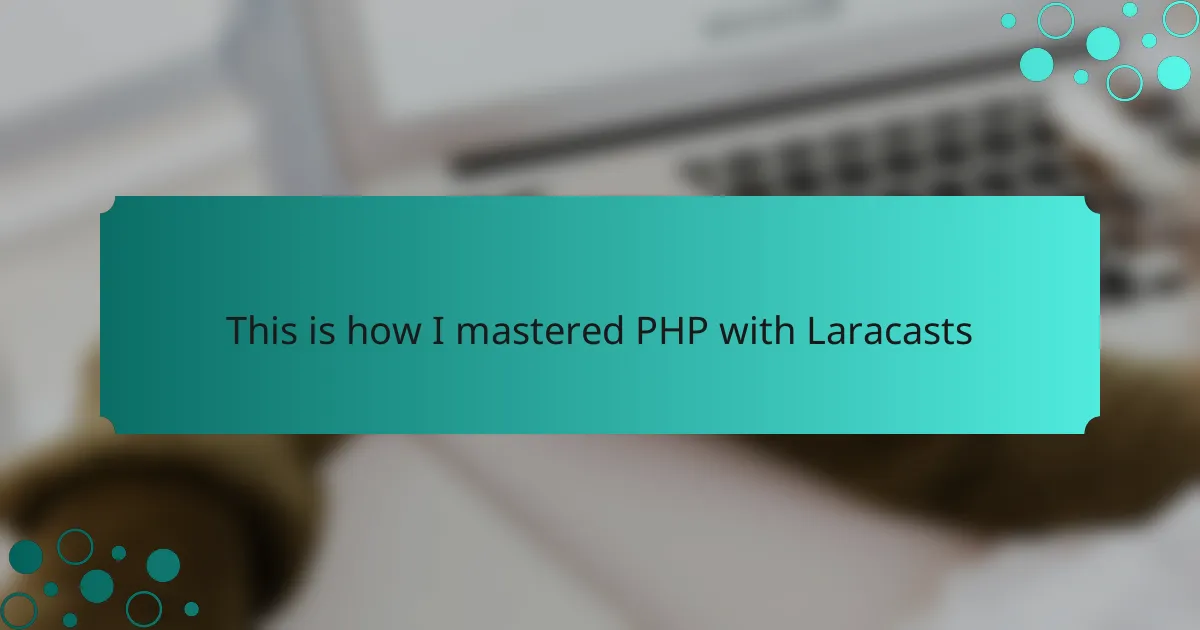Key takeaways
- Understanding basic PHP concepts like variables, arrays, and functions is essential for building confidence in programming.
- Laracasts offers a supportive community and practical tutorials that connect theory with real-world applications, enhancing the learning experience.
- Video tutorials provide visual and auditory learning, allowing students to grasp complex topics at their own pace and engage with the material more effectively.
- A structured learning path that integrates practical projects helps solidify knowledge and motivate continued exploration of advanced programming topics.
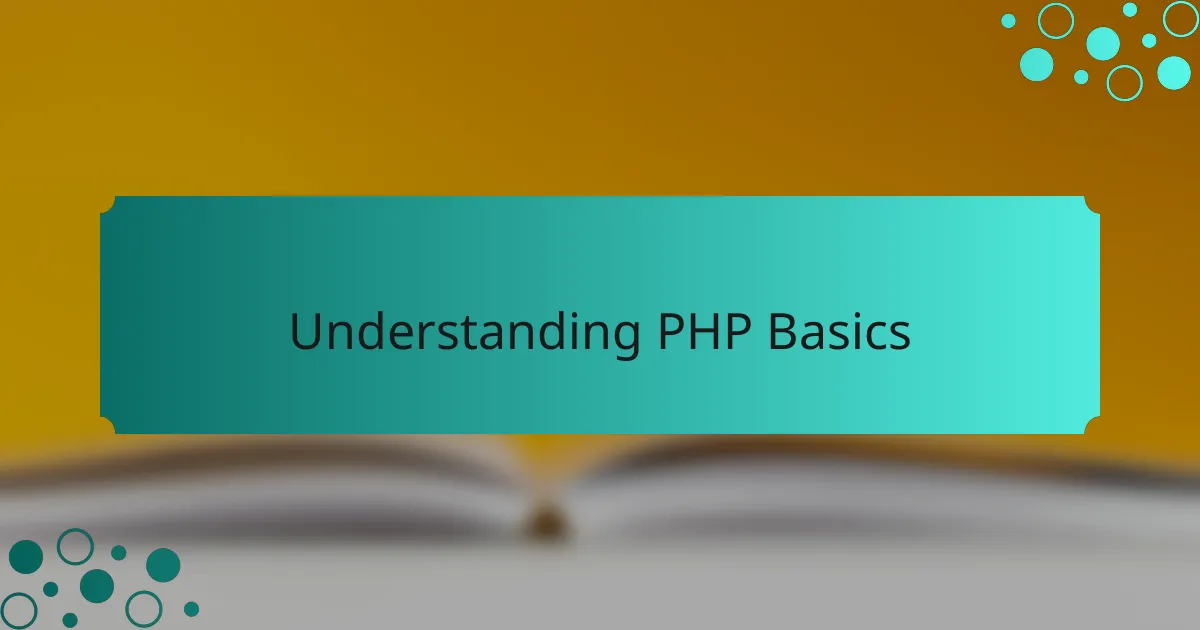
Understanding PHP Basics
Understanding PHP Basics
When I first delved into PHP, I realized it was vital to grasp the foundational concepts. PHP is a server-side scripting language primarily designed for web development. Its syntax is so straightforward that it felt like learning a new language was not as daunting as I had feared.
The trial and error I experienced while coding was truly enlightening. I remember the excitement I felt when a simple script finally produced the desired output, reinforcing my understanding of variables, arrays, and functions. These basic building blocks are what make programming feel less intimidating and more like a puzzle waiting to be solved.
Here’s a quick comparison of essential PHP concepts that helped me get started:
| Concept | Description |
|---|---|
| Variables | Containers for storing data, allowing you to reuse values. |
| Arrays | Data structures that hold multiple values, useful for managing lists. |
| Functions | Reusable blocks of code that perform specific tasks, which enhance modularity. |
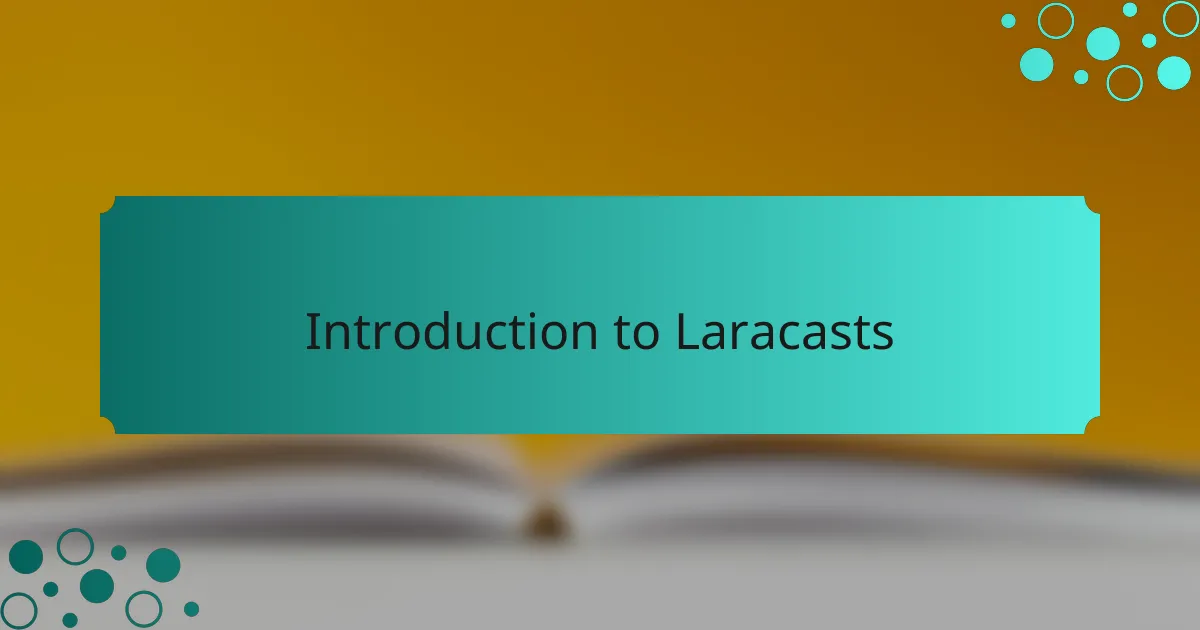
Introduction to Laracasts
When I first discovered Laracasts, it felt like stumbling upon a treasure trove of knowledge. The platform was unlike any other I had encountered; it offered not just tutorials but a community of developers eager to learn and share. I remember my excitement as I dove into the bite-sized videos, realizing how effectively they broke down complex PHP concepts into digestible pieces.
One of the aspects I truly appreciate about Laracasts is its focus on real-world applications. I can recall a specific project where I applied the lessons learned from a series on Eloquent ORM, transforming a daunting task into a manageable one. That moment not only boosted my confidence but also deepened my appreciation for clean, elegant code.
Here are some key features of Laracasts that stand out:
- A vast library of video tutorials covering PHP, Laravel, and more.
- Real-world examples that connect theory to practical application.
- An engaging community forum for discussion and support.
- Accessible lessons that cater to both beginners and experienced developers.
- Regularly updated content that keeps pace with the ever-evolving tech landscape.
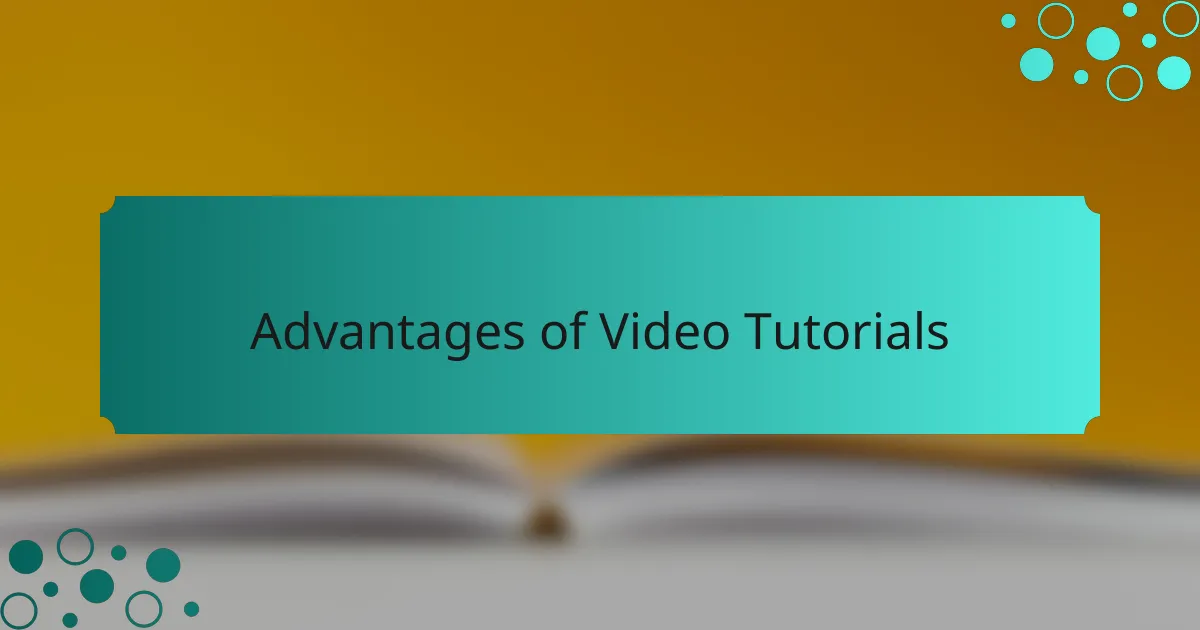
Advantages of Video Tutorials
Video tutorials offer a unique advantage by combining visual learning with auditory explanations, making complex topics much easier to understand. I still remember the first time I watched a Laracasts video where the instructor demonstrated a PHP function with a live coding session. It made the abstract concepts much more tangible, allowing me to see the code in action, which is something I often struggled with when reading text-based tutorials.
Another significant benefit of video tutorials is the ability to learn at your own pace. I often found myself pausing, rewinding, and replaying segments until I fully grasped a concept. This flexibility allows me to focus on challenging areas, ensuring I’m not just absorbing information but truly mastering it. Have you ever felt lost in a sea of code? Having a visual guide can often illuminate a path through confusion.
Lastly, the interactive elements of video tutorials, like coding along with the instructor, create an engaging learning experience. I recall following along as I built a small application based on the principles shown in a Laracasts episode. The thrill of seeing my code work in real-time was exhilarating and reinforced my learning in a way that static text simply could not. This engagement made me look forward to each new tutorial, transforming my learning journey into something enjoyable.
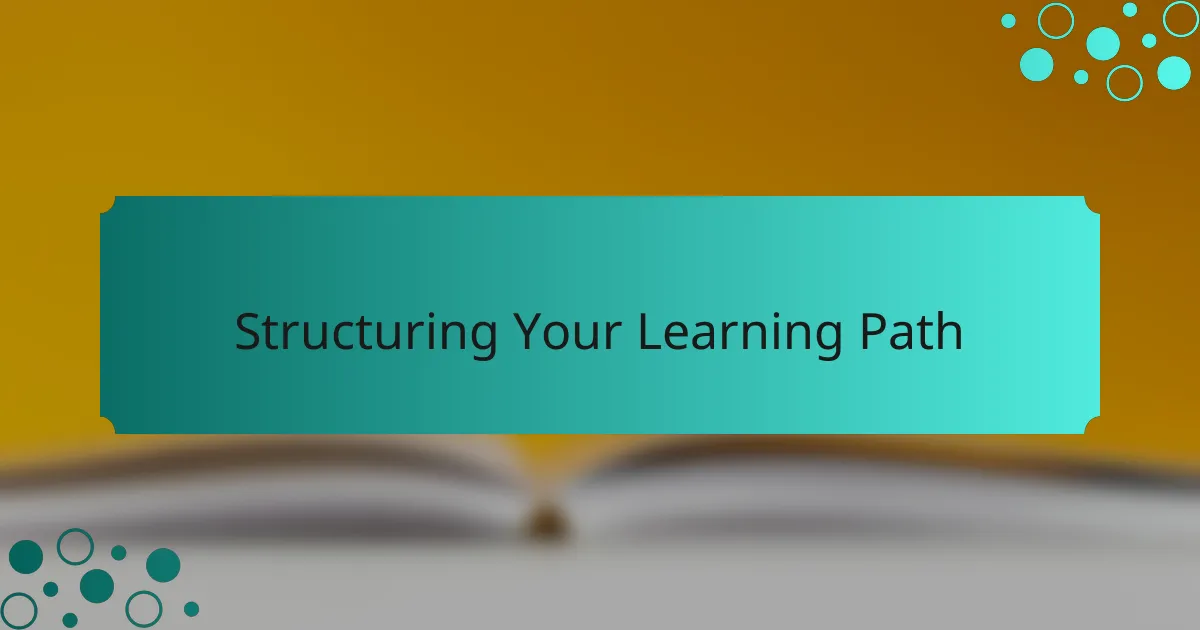
Structuring Your Learning Path
When I decided to dive into PHP, structuring my learning path was crucial. I needed a roadmap to navigate the vast resources available. By focusing on foundational concepts first, like PHP syntax and functions, I built a solid base before moving on to more complex topics like object-oriented programming and frameworks.
I found that integrating practical projects along the way made all the difference. It wasn’t just about watching tutorials; applying what I learned kept me engaged and motivated. Seeing my code come to life in small projects was incredibly rewarding and reinforced my understanding.
Here’s a simple table that outlines the structured learning path I followed, comparing key concepts and project types:
“`html
| Learning Phase | Focus Area |
|---|---|
| Beginner | PHP Basics and Syntax |
| Intermediate | Object-Oriented PHP |
| Advanced | Laravel Framework and APIs |
| Project Application | Build Small Applications |
“`
By using this structured approach, I not only mastered PHP but also developed the confidence to tackle more advanced topics in my programming journey.
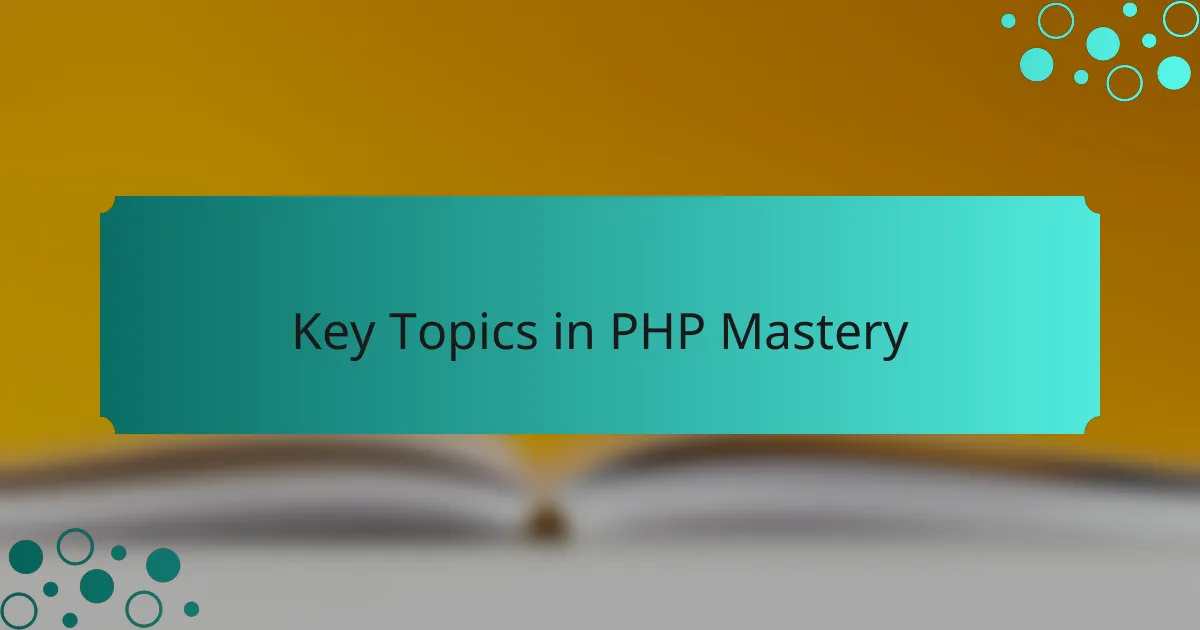
Key Topics in PHP Mastery
Mastering PHP is a journey filled with key concepts that form the backbone of effective programming. For me, grasping the fundamental principles, such as variables, arrays, and loops, was vital. I remember the moment it clicked when I built a simple CRUD application—seeing my code come to life was an exhilarating experience that fueled my desire to learn more.
As I delved deeper into PHP with Laracasts, I discovered advanced topics that elevated my skill level. Concepts like object-oriented programming (OOP) and dependency injection transformed the way I approached coding. I found that building applications with a clean architecture made my projects more manageable, and I was surprised by how much easier it became to collaborate with others.
Key Topics in PHP Mastery:
– Variables, data types, and operators
– Control structures (if statements, loops)
– Functions and scope
– Arrays and array functions
– Object-oriented programming (classes and objects)
– Exception handling
– Database interaction with MySQL
– RESTful APIs and web services
– Laravel framework and its components
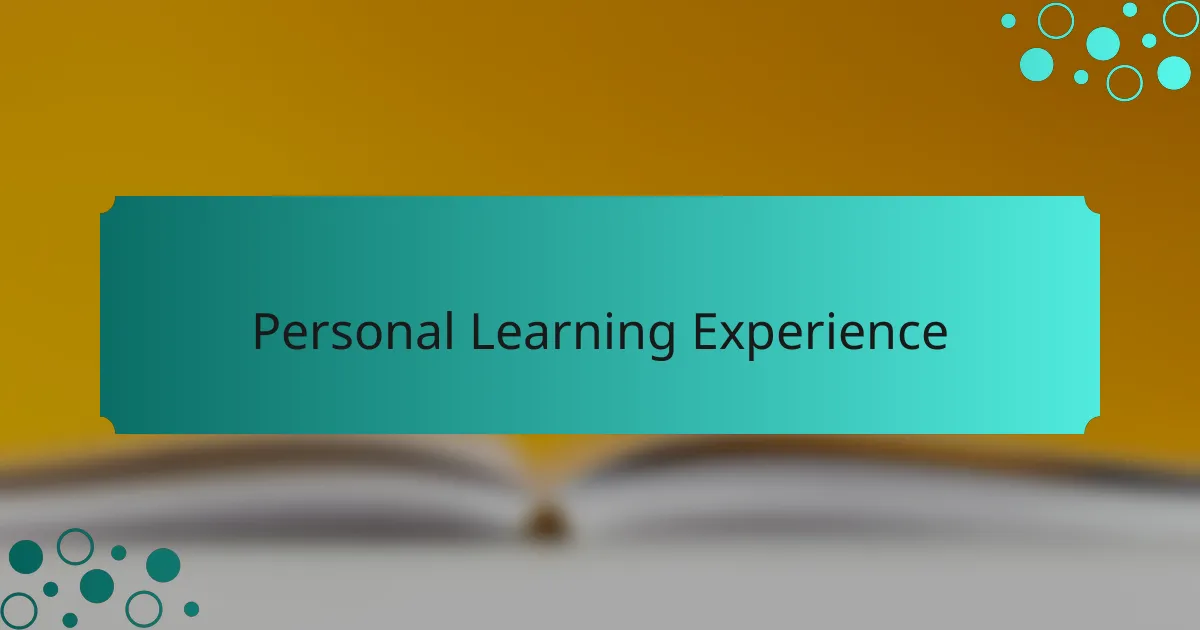
Personal Learning Experience
As I reflected on my personal learning experience with PHP through Laracasts, I realized how integral a structured approach was to my success. Each video felt like a stepping stone, guiding me through the complexities of PHP. I remember the thrill of completing my first small project; it wasn’t just code—it was a manifestation of my newly acquired skills, sparking a deeper passion for programming.
I also discovered how important it is to embrace mistakes as I learned. I vividly recall spending hours debugging a simple error, feeling frustrated yet determined. That challenge ultimately taught me resilience and problem-solving, turning those moments of confusion into powerful lessons. Have you ever felt that rush of satisfaction when you finally crack a tough problem? There’s nothing quite like it to boost your confidence as a developer.
Looking back, I see that my emotional investment played a key role in my learning journey. Connecting with the community on Laracasts was a game changer. Engaging in discussions and sharing my experiences with fellow learners made me feel like I was part of something much bigger than myself. It reminded me that programming is not just about writing code; it’s about collaboration and learning from one another.
